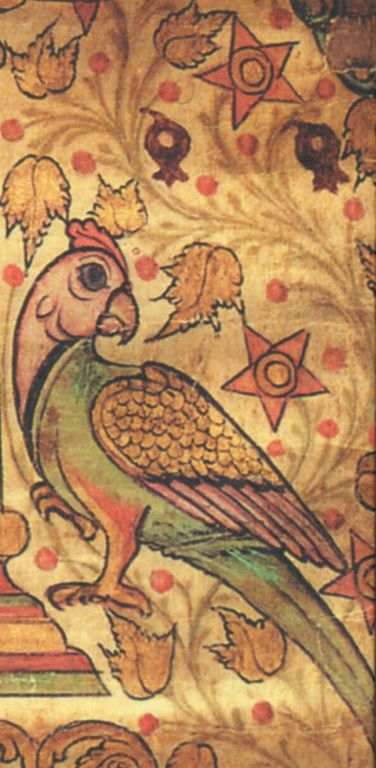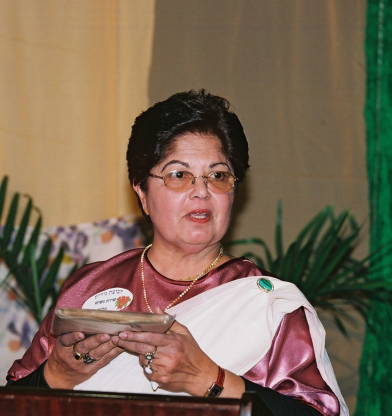1977
25. Song of the Four Crowns
Miriam Eliyahu. Recorded by Shirley Isenberg and Edith Gerson-Kiwi, Moshav Mesillat Tzion, October 26, 1977; II-60.
Taṃbirān muyiṃbu tŏnayāyirikkeņaṃ
Tanḍě tŏņayālě nāl muḍikaḷuṃ
1. May the Lord Tambiran be our first help.
With Tambiran’s help, there were four crowns.
From heaven above, four crowns came down.
The crown of Torah was the one Moshe took.
The crown of priesthood was the one Aaron took.
The crown of kingship was the one David took.
The crown of a good name the righteous man took.
That was the way four crowns came down.2. With Moshe’s permission, the Torah was taken.
With Aaron’s permission, the priesthood was taken.
With David’s permission, the kingship was taken.
With the righteous man's wisdom, the good name was taken.
It’s good, very good to have a good name.
Like good old oil may your name be good.
Good oils can spoil when they are old.
Good names won’t spoil as they age.3. To the bridegroom we wish happiness.
In our congregation may you be great.
May you be like a flowing river,
And like a shield in the time of war.
The ways of the Lord may you follow in full.
Blessings, blessings—forever be blessed.
Most worthy of praise is Lord Tambiran.
May Your name always be praised.
This song in honor of a bridegroom is found in eight women’s notebooks, from Parur, Ernakulam, and Kochi-Kadavumbhagam. It combines translations of two piyyutim that are sung by Kerala Jews in the synagogue on the morning of Simḥat Torah, the holiday that celebrates the completion of the yearly cycle of reading the entire Torah and the beginning of a new cycle. The person who is given the honor of reciting the blessing for the reading of the first Torah portion (starting with Genesis 1:1, “In the beginning…”) is called ḥatan bere’shit, the bridegroom of “In the Beginning.” It is the custom to give that honor to a newly married man.
The first two stanzas of the Malayalam song are taken from an Aramaic-language piyyut that is sung before the ḥatan bere’shit is summoned to the tebah. The piyyut is ’Arba‘ah Kelilin (’Areshet 1980, 169–170), telling the story of four crowns descending from heaven. The story echoes this passage from Pirkei ’Avot 4:13: “R. Simeon said: There are three crowns, the crown of Torah, the crown of priesthood and the crown of kingship, but the crown of a good name excels them.”[1]
The Aramaic piyyut expands on this narrative about the crowns by contrasting a good name with good oil (as in Ecclesiastes 7:1, “A good name is better than good oil”[2]). The last two lines of stanza 2 in the Malayalam song were found in only one notebook—from Parur—apparently an effort to elucidate this comparison of a good name with good oil. Zacharia explains that the Malayalam phrase that we have translated as “good old oil” refers to a traditional Kerala women’s process of preserving oil by combining it with herbs and heating it (2005, 190–191).
The third stanza of the Malayalam song is based on the Hebrew song Yismaḥ Ḥatani (’Areshet 1980, 170), wishing happiness to the bridegroom, which is sung in the synagogue after the Aramaic piyyut.
The only available recording was made in Israel in 1977, sung by Miriam Eliyahu from Ernakulam. Zacharia (2005,101–102) offered two texts of the song, based on significant linguistic differences among the notebook variants, and our English translation is a composite effort.
_________________________
[1] Trans. Joshua Kulp, https://www.sefaria.org/Pirkei_Avot.4.13?lang=bi
[2] Trans. Bruce Heitler, Kohelet, https://www.sefaria.org/Ecclesiastes.7.2?ven=Kohelet_by_Bruce_Heitler&lang=bi&with=Translations&lang2=en






